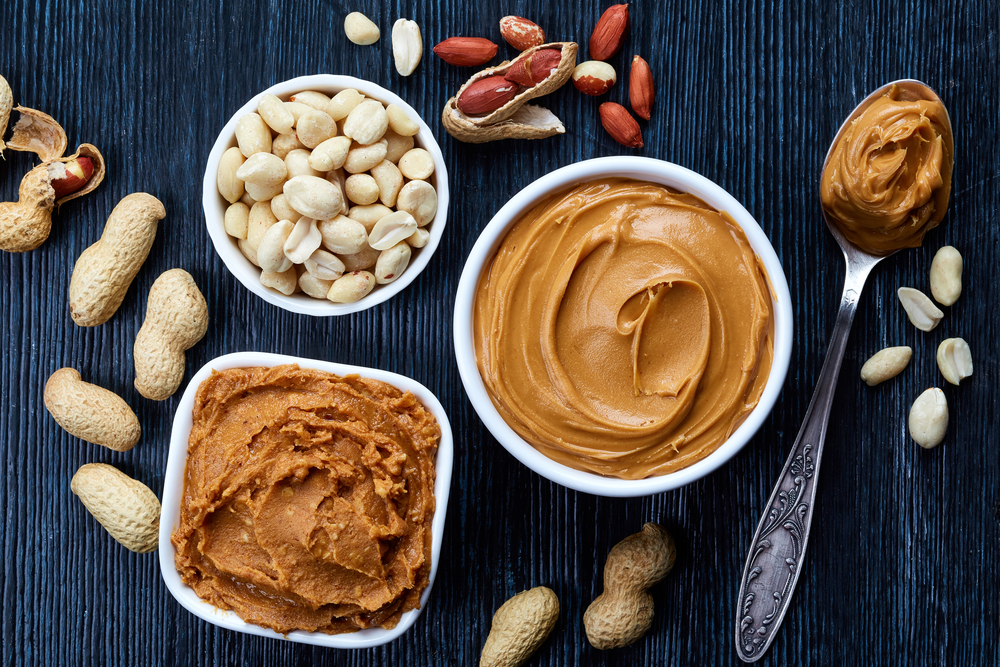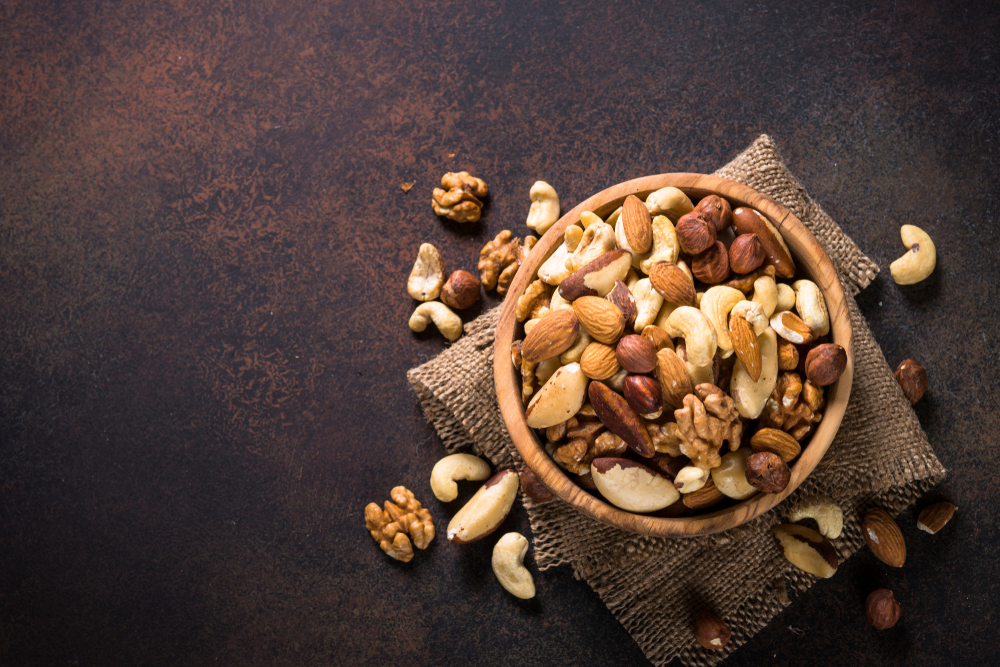Who wouldn’t love peanuts?
Americans adore peanuts, that’s a fact. Only last year, a staggering 5.9 billion pounds were made in the United States, according to Statista. Whether we’re talking about roasted or salted as a snack, spread on toast, or even added to recipes for extra flavor, peanuts are oftentimes that beloved and versatile food. However, are they any good for you?
Beyond the fact that they are extra tasty, peanuts also pack a nutritional punch. Very rich in protein, healthy fats, and different vitamins and minerals, they can easily support everything from heart health to muscle recovery.
But like any other food, nuts also have benefits and potential drawbacks that should be considered long before adding more of these legumes to your diet. If you need some help to decide, we talked with numerous registered dietitians to help us break down the pros and cons of eating peanuts.
Here’s what they had to say, so you can make a widely informed decision for your health. First, we will enlist all the reasons as to why nuts are good for you.

They are a wonderful source of plant protein
According to Destini Moody, RDN, CSSD, LD, a registered dietitian and sports dietitian with Garage Gym Reviews, explained that for every 100 grams of peanuts, there are also 25 grams of protein, which gives peanuts around 25 percent protein by weight.
This high amount of protein makes peanuts a wonderful option for those who are looking to increase their protein intake, especially vegans and vegetarians. Besides, the amino acids in peanuts support muscle repair and growth, which is very important for anyone living a healthy and active lifestyle.
They can boost your heart health
Research also proved that including certain nuts like nuts in a well-balanced diet can be one of the best ways to protect your heart while also enjoying a nutrient-packed snack.
“Peanuts are quite high in monosaturated and polyunsaturated fats, which are very beneficial for heart health.” Gianna Masi, CPT, RDN, a certified personal trainer and registered dietitian with Barbend, explained.
She also added that all these healthy fats help lower low-density lipoprotein (LDL) cholesterol, which is often referred to as “bad” cholesterol, and also increase high-density lipoprotein ((HDL) cholesterol, or “good” cholesterol, to help reduce the risk of coronary heart disease and stroke.
They are very rich in magnesium
So many people don’t get enough magnesium, and that’s why peanuts come in handy: they significantly boost this important nutrient. Moody also mentioned that “one cup of peanuts comes with 30% of your daily value of magnesium.” which the National Institute of Health said can help support bone health, cardiovascular function, and a healthy nervous system.
They support healthy weight management
Because of their nutrient density, nuts can be quite useful when it comes to managing weight. In fact, with a high protein and fiber content, nuts can easily promote a feeling of fullness, which definitely helps control the appetite and reduce overall calorie intake.
The fats in nuts are also slowly processed, which prolongs satiety. This can definitely be good for weight management and preventing overeating.
They’re good with fighting inflammation
Inflammation is often linked to many chronic diseases, and studies have discovered that nuts have a series of compounds that help combat such issues. Peanuts also have multiple antioxidants, like p-coumaric acid and resveratrol, which definitely help fight oxidative stress in the body.
They can improve digestive health
Peanuts are a wonderful source of fiber, which is a fairly important nutrient for healthy digestion. Masi explained that “nuts support healthy digestion by promoting regular bowel movements and preventing constipation.” Moreover, fiber also supports a healthy gut microbiome, which can boost digestive health and immune function.
They help regulate blood sugar
Peanuts are rich in high fats and fiber content, which help control blood sugar levels. Studies have also shown that consuming nuts (such as peanuts) can definitely help prevent and manage type 2 diabetes.
The thing is that fat in peanuts also slow digestion, which prevents blood sugar spikes, especially when consumed with other foods, and especially those high in simple carbohydrates.
Now, drawbacks: They are high in calories
As peanuts are nutrient-dense, they are also quite calorie-dense. Because peanuts, just like other nuts, are quite high in heart-healthy fats. However, this also means that they are quite high in calories.
To avoid overeating calories, the best thing you can do is to portion out your servings of peanuts beforehand, especially if you have been watching your weight and calorie intake.

They are rich in oxalates
Peanuts are quite rich in oxalates, which are compounds that can easily bind with calcium and form calcium oxalate crystals. In individuals who are susceptible to either gout or other conditions, high oxalate consumption can easily contribute to the formation of kidney stones, which can cause pain and discomfort.
People who also have a history of kidney stones should monitor their oxalate intake.
They could be high in sodium
Salted peanuts can be extremely high in sodium, especially if you’re not very mindful of your intake. “Dry roasted, salted nuts can also have an average of 410 milligrams of sodium per 100 grams” as Moody explained.
For those who are trying to be more mindful of their sodium intake or people who suffer from heart conditions, the best thing to do is to choose unsalted or lightly salted nuts to avoid exceeding the daily recommended sodium limit of 2,3000 milligrams per day.
So are nuts good for us?
Peanuts can be one of the healthiest additions to your diet. They also provide numerous benefits, like being a good source of plant protein, heart-healthy fats, magnesium, and fiber, which can definitely aid in muscle repair, heart health, digestion, as well as weight management, and blood sugar regulation.
They also pack plenty of antioxidants that help combat inflammation. But peanuts are quite calorie-dense, and they can also be high in sodium if salted. Besides, their oxalate content can also pose a huge risk for individuals who are prone to kidney stones.
You can opt for unsalted varieties to enjoy nuts’ benefits, while also minimizing potential drawbacks.
Benefits: longer life span
Eating peanuts could potentially increase your life span. In fact, a large-scale study discovered that people who constantly eat nuts (even peanuts) are less likely to die of any cause than those who barely eat any.
Since the study was purely observational, it can’t prove that nuts were 100% the reason that caused the lower death rates, but they are definitely associated with them.
How to properly eat them
Peanuts can be either eaten raw, blanched, roasted, boiled, fried, powdered, or even made into peanut butter. Eating them with their thin and papery skin definitely comes with the most benefits, especially since the skin has many antioxidants and phytochemicals. Adding more nuts to your diet is quite easy, as you can eat them raw or as peanut butter.
Here are some of the most delicious ways in which you can have nuts:
- bake nuts into cookies and pies
- make a peanut butter and banana sandwich
- add peanut butter to hummus
- to the yogurt with peanuts
- toss nuts in a salad
- add peanuts to your stir fry or noodles dish
If you found this article useful, we also recommend checking: 6 Terrible Side Effects of Eating Canned Tuna







